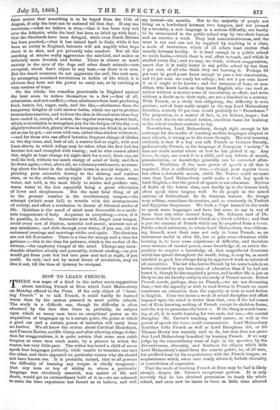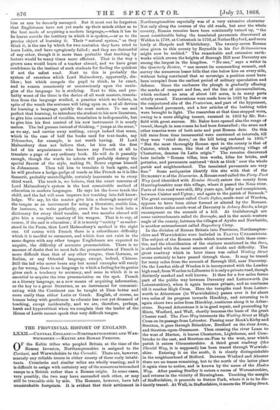HOW TO LEARN FRENCH.
THERE was sense of a kind in the rather naive suggestions about teaching French at Eton which Lord Malmesbury on Monday offered to the Peers. If the only object of " learn- ing French " is to talk French, it could hardly be learned -worse than by the system pursued in most public schools. 'The study is a difficult one, though its difficulty is often 'obscured by the fact that there is, probably, no subject upon which so many men have an exceptional power as the acquisition of languages up to a certain point, the point at which a good ear and a certain power of imitation will carry them no farther. We all know the stories about Cardinal Mezzofanti, and Francis Xavier, andDr. Carey, and after allowing a large deduc- tion for exaggerations, it is quite certain that some men catch tongues as some men catch music, by a process in which the reason has very little part. The writer has heard a child of seven speak four languages perfectly, while unable to translate one into the other, and there appeared no particular reason why she should not have known ten. It is probable, indeed, that to all persons the difficulty of learning any tongue is chiefly imaginary ; that any man or boy of ability to whom a particular language was absolutely essential, was matter of life and death, would get an extraordinary hold of it in—we are ashamed to state the time experience has forced us to believe, and will
say instead—six months. But to the majority of people not living on a borderland between two tongues, and not pressed by a necessity, a new language is a serious difficulty, one hardly to be surmounted in the public-school way by two short lessons and an exercise a week. They lack concentrativeness, and the want is not and can not be supplied by teaching in a class, a mode of instruction which of all others least excites that usually dormant faculty. It is hard enough in a public school to teach Latin,—which there is real effort to teach, and which is studied every day ; and we may, we think, without exaggeration, assert that it is really learnt in any public school by less than 5 per cent. of all who think they are learning it. Perhaps 30 per cent. in good years know enough to pass a fair examination, and 15 per cent. are ready for college ; but not 5 per cent, know it as it ought to be known ; and the instances of boys, or men either, who know Latin as they know English, who can read an author without a mental sense of uncertainty or effort, and write without a doubt as to their style, are not a hundred in a century. 1Vith French, as a study less obligatory, the difficulty is even greater; and of boys really taught in the way Lord Malmesbury describes, scarcely 10 per cent. would probably be " Frenchmen." The proportion, as a matter of fact, is, we believe, larger ; but that is not due to the school tuition, excellent bases for learning us the school teachers contrive to lay.
Nevertheless, Lord Malmesbury, though right enough in his contempt for the modes of teaching modern languages adopted at most schools, is wrong as to his inner thought. His real meaning evidently is that if a boy can talk French or German fluently, preferentially French, as the language of European "society," it does not much matter where or how he has picked it up. Any bonne, he says, can teach it to a child, and any defects of accent, pronunciation, or knowledge generally can be corrected after- wards. Doubtless, if the mere power of speech is all that is required, that is sufficiently true, — though your regular bonne has often a detestable accent, which Mr. Tarver could no more cure than Lord Malmesbury could make a Cork boy speak in hard English,—but the power of speech is not education. Natives of India of the lowest class, men hardly up to the human level, often speak three tongues well. So do people in the mixed cantons of Switzerland. So do Austrian waiters. So, though very seldom, sometimes do couriers, and so constantly do Turkish and Egyptian dragomans. We back a Copt trained to the trade to speak more languages and have less sense to say in any of them than any other created being. Dr. Johnson said of Dr. Barnes that he knew as much Greek as a Greek cobbler ; and that is just the amount of French which can be acquired from a bonne. Public-school reformers, to whom Lord Malmesbury was address- ing himself, want their sons not only to learn French, as an instrument useful in after life, but to gain some education while learning it, to have some experience of difficulty, and therefore some increase of mental power, some knowledge of, or rather dis- position to acquire a knowledge of, that magnificent literature which has spread throughout the world, doing, it may be, as much mischief as good, but always doing its appointed work as solvent of all unrealities. The lad who learns French by his nurse's side is no better educated in any true sense of education than if he had not learnt it, though he has acquired a power, and in after life is just as likely to use his faculty solely in the study of French novels. Better French novels, perhaps, than no French,—we are not discussing that,—but the capacity or wish to read fiction in French no more constitute an education than the capacity or wish to read fiction in English. Even two hours a week of sound discipline and effort imposed upon the mind is better than that, even if the lad comes out of Eton knowing nothing of French except its skeleton forms, and the way to pronounce the letter u. If the thing is worth learn- ing at all, it is worth learning for two ends, not one,—the mental discipline Mr. Tarver's teaching would ensure, as well as the power of speech the bonne could communicate. Lord Malmesbury doubtless talks French as well as Lord Brougham did, or Sir Thomas Henry was recently said to do, but that does not prove that Lord Malmesbury benefited by learning French. If we may judge by the extraordinary want of logic in his speeches, by the discursiveness, obscurity, and fondness for ellipses which hide Lord Malwesbury's mind from the outside public, he, of all men, has profited least by his acquaintance with the French tongue, an acquaintance which, when once really attained, forbids obscurity or convolution of expression.
That the mode of teaching French at Eton may be bad is likely enough, despite Mr. Tarver's exceptional powers. It is only recently that he has obtained permission to teach the whole school, and even now he seems to have as little time allowed
him as can be decently managed. But it must not be forgotten that Englishmen have not yet made up their minds either as to the best mode of acquiring a modern language,—when it has to be learnt outside the territory in which it is spoken,—or as to the precise object of learning it. Their " natural system," as they think it, is the one by which for two centuries they have tried to learn Latin, and have egregiously failed ; and they are distrustful of any other, though it is more than probable that teaching by lecture would be many times more efficient. That is the way a grown man would learn of a teacher abroad, and we have great confidence in the instinct of such students for finding the quickest if not the safest road. Next to this is probably the system of exercises which Lord Malmesbury, apparently, dis- likes ; but which compels the pupil to think, to be exact, and to reason consciously or unconsciously upon the analo- gies of the language he is studying. Next to this, and pro- bably worst of the three is the device of all weak masters, transla- tion from the language studied, a practice which we believe, in spite of the wrath the sentence will bring upon us, is of all devices for learning a language quickly the most useless. To use and perfect that learning, to introduce the student to his new literature, to give him command of vocables, translation is indispensable, but to give him his first control of his new instrument it is nearly useless. The lad guesses instead of thinking, " jumps at the sense," as we say, and carries away nothing, except indeed that sense, which in the case of half the books used for text-books, say Telemachus, for example, is not worth having. If Lord Malmesbury does not believe that, let him ask the first lad of his acquaintance who knows any French at all to translate a page of any ordinary book. He will do it passably enough, though the words he selects will probably destroy the special flavour of the style, making St. Beuve express himself in Johnsonese. Then tell him to translate it back again, and he will produce a hodge-podge of words as like French as it is like Sanscrit, probably unintelligible, certainly inaccurate as to every third word. The truth is, we believe, that the exact converse of Lord Malmesbury's system is the best conceivable method of education in modern languages. He says let the bonne teach the child, and the lad will soon improve her teaching into full know- ledge. We say, let the master give him a thorough mastery of the tongue as an instrument for using a literature, enable him, for instance, to write perfectly, even if he has to look into a dictionary for every third vocable, and two months abroad will give him a complete mastery of his weapon. That is to say, of course, if the end is education ; if it is merely " society " as under- stood in the Peers, then Lord Malmesbury's method is the right one. Of course with French there is a subordinate difficulty which it is needful to surmount, and which does not exist in the same degree with any other tongue Englishmen are expected to acquire, the difficulty of accurate pronunciation. There is no manner of doubt that to most lads the pronunciation of French is more difficult than that of any other tongue, than German, or Italian, or any Oriental language, except, indeed, Chinese. Still the lad who never hears any but sound examples will rarely go far wrong, there is no language in which a feeling for its genius gives such a tendency to accuracy, and none in which it is so essential to acquire the true pronunciation on the spot. French as a literary language, as a new means of acquiring information, as the key to a great literature, as an instrument for communi- cating with the Continent can be taught at Eton better and more easily than either Latin or Greek. English, of course, no human being with gentlemen to educate has ever yet dreamed of teaching, except incidentally, and we are, therefore, perhaps, harsh and hypercritical when we complain that the leader of the House of Lords cannot speak that very difficult tongue.































 Previous page
Previous page